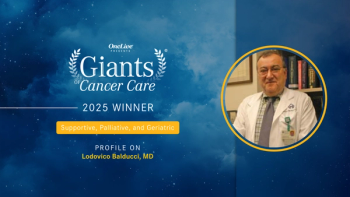
Changing Treatment Landscape for RCC
For High-Definition, Click
The optimal time to initiate systemic treatment in individuals with low volume, indolent renal cell carcinoma (RCC) remains unclear. Brian I. Rini, MD, considers initiating therapy if a patient experiences acceleration of disease growth or develops new sites of disease. For example, the development of liver metastases is indicative of an increased pace of disease, and Rini would initiate systemic therapy in such patients.
Optimal selection of second-line treatment is also uncertain. No specific biomarkers are available to help physicians determine which agent to use, remarks Daniel Heng, MD, MPH. Axitinib, a tyrosine kinase inhibitor (TKI), and everolimus, an mTOR inhibitor, have both been evaluated in phase 3 studies in patients who experienced disease progression after primary therapy. For the individual with liver metastases, Heng would choose axitinib and titrate the dose up. Rini notes that the optimal dose escalation procedure for axitinib has not been established.
Should a patient experience disease progression on second-line therapy, Janice P. Dutcher, MD, notes that options include any therapies that have not yet been administered, which in the hypothetical patient with liver metastases would include an mTOR inhibitor, a clinical trial, or immunotherapy.
Charles A. Henderson, MD, comments that the landscape of kidney cancer has changed dramatically since he first started practicing; the pace of change has been especially rapid over the last 10 years. Today, individuals with RCC may have remissions that last over 1 year with first-line and second-line therapies, notes Figlin. Regarding the future of therapy for patients with kidney cancer, Dutcher and Heng look forward to the identification of biomarkers to guide treatment selection and the development of novel therapies, including targeted therapy and immunotherapy.



































